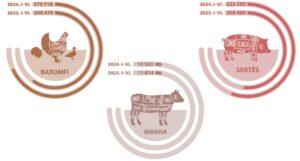Cattle slaughterings down by more than 10 percent
39.8 thousand cattle were slaughtered in the first half of 2024, 10.4 percent less than in the same period of the previous year. The live weight of the slaughtered animals was 20.4 thousand, and the carcass weight was 10.6 thousand tons. The live and carcass weights were 11.5 and 11 percent lower than a year earlier, respectively.

(Illustration: AKI PÁIR)
Cattle slaughter in live weight was nearly 3,400 tons per month on average in January–June 2024, while the highest monthly value – in April – exceeded 4,100 tons. 62 percent of the slaughtered cattle were cows, 20 percent were bulls. Cow slaughter decreased by 12.5 percent, bull slaughter by 0.7 percent, and heifer slaughter by 17.5 percent in terms of number in the first half of 2024 compared to the base period.
According to the Central Statistical Office (KSH), Hungary imported over 9 thousand tons of live cattle in the first five months of 2024, in addition to nearly 31 thousand tons of exports
The volume of exports increased by 11.6 percent, while imports increased by 3 percent compared to the value in January–May 2023. Live cattle exports were mainly directed to Kosovo, Croatia and Austria, with 53 percent of exports going to the three destination countries in this period. Imports came primarily from Denmark, Germany and Italy in January–May 2024, with nearly 55 percent of imports coming from these three countries.
According to preliminary data from the Central Statistical Office, the total number of cattle was 862.8 thousand on June 1, 2024
The stock has decreased by 11.8 thousand since June 2023, and has increased slightly since December 2023 (+0.7 thousand). The number of cows was 406 thousand on June 1, 2024, 4 percent less than a year earlier (–17,200 units).
AKI PÁIR
Related news
KSH: The volume of exports of food, beverages and tobacco decreased by 5.7 percent, while imports decreased by 13 percent
🎧 Hallgasd a cikket: Lejátszás Szünet Folytatás Leállítás Nyelv: Auto…
Read more >State compensation for the victims of Bászna Gabona Zrt. has been completed
🎧 Hallgasd a cikket: Lejátszás Szünet Folytatás Leállítás Nyelv: Auto…
Read more >Related news
Innovations, success stories and awards on the same stage
🎧 Hallgasd a cikket: Lejátszás Szünet Folytatás Leállítás Nyelv: Auto…
Read more >Farewell day at the 60th anniversary EuroShop trade fair
🎧 Hallgasd a cikket: Lejátszás Szünet Folytatás Leállítás Nyelv: Auto…
Read more >NAV: Women’s Day inspections begin
🎧 Hallgasd a cikket: Lejátszás Szünet Folytatás Leállítás Nyelv: Auto…
Read more >








